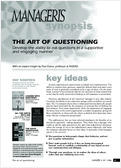Get back into the habit of asking questions

Business leaders are rarely represented as people who question themselves. Yet, managers should be equally able to question as they are to affirm; but it seems this capability has somewhat been lost. How to get it back?
Taking a break and wondering whether we are right. Stopping the flow of arguments exchanged in a meeting and asking: “Why is this issue truly important?” Such behaviors are somewhat unnatural in business situations that give priority to action and effectiveness. They can even be perceived as awkward and inappropriate. Because the objective is to move ahead, to find solutions, responses. Of course, this could be achieved by asking questions… but as few as possible, and preferably those that enable the collection of missing data. Going any further is often perceived as a waste of time, a luxury exclusively available to those that have been spared from the pressure of results.
In reality, questions can be an excellent lever of effectiveness, from several perspectives. When having to innovate or to solve a delicate issue, our automatic reaction is to produce ideas. But producing questions is equally valuable. An unexpected question prompts us to look at the issue from a new angle. It leads us to pay attention to facts or ideas which we would have otherwise not considered—and thus to feed creativity. Questions are also a way of rallying people. The author of Questions Are the Answer invited 1,500 leaders to spend four minutes brainstorming to find the greatest possible number of questions relating to an issue that preoccupied them—without seeking to answer them. He asked them to describe their emotional state before and after the experiment. Before the experiment, the most mentioned words were “frustrated”, “anxious”, “nervous”, “worried”. After the brainstorming, the most used adjectives had become “excited”, “motivated”, “optimistic”, “inspired”. Questions also allow us to establish bonds with our counterparts. According to a study by Harvard Business Review, the greatest regret of people who just had a conversation—be it an interview, a professional, friendly or romantic appointment—was that their counterpart had not asked more questions.
How can you get back into the habit of asking questions from others, or from yourself? How can you overcome the numerous obstacles to questioning—feeling of wasting time, fear of appearing ignorant or indecisive?
In this synopsis:
– Successfully conduct brainstorming for questions to feed creativity
– Make space again for questioning
– Seek contradiction
SubscriberSign in
to download
the synopse (8 p.)
VisitorI want to buy
this synopsis (8 p.)
VisitorI want
to subscribe
See also

Ask questions to engage people
The culture of asking questions is not very widespread in corporate circles. Yet, it is an invaluable driver of engagement and progress. How can we get the most out of it to mobilize energies?



